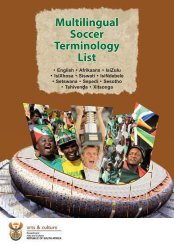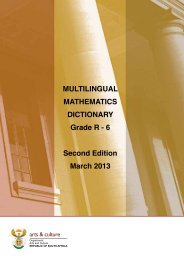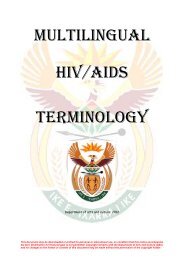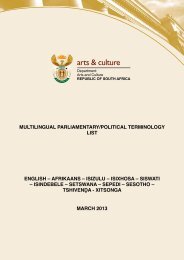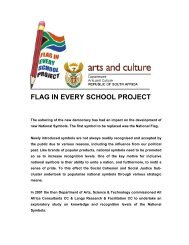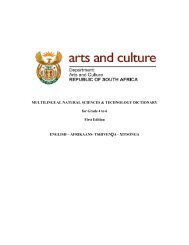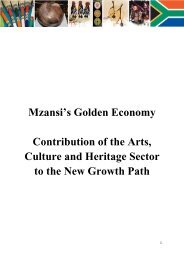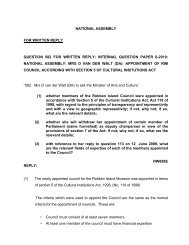multilingual parliamentary/political terminology list - Department of ...
multilingual parliamentary/political terminology list - Department of ...
multilingual parliamentary/political terminology list - Department of ...
Create successful ePaper yourself
Turn your PDF publications into a flip-book with our unique Google optimized e-Paper software.
The terms were identified, excerpted and documented. The team identified the<br />
terms that required definitions and even translated some <strong>of</strong> them. The definitions<br />
facilitated the coining <strong>of</strong> isiXhosa equivalents, as the meaning <strong>of</strong> the terms as set<br />
out in the definitions formed the basis according to which the collaborators found<br />
or coined equivalents in the target languages.<br />
The NLS took the project further by including the other <strong>of</strong>ficial languages. The<br />
terminologists <strong>of</strong> the Terminology Coordination Section (TCS) <strong>of</strong> the NLS worked<br />
very hard to adapt the terms according to terminographical principles. A closer<br />
analysis <strong>of</strong> the terms revealed that the <strong>list</strong> comprised both <strong>parliamentary</strong> and<br />
<strong>political</strong> terms. When this was brought to the attention <strong>of</strong> the compilers <strong>of</strong> the<br />
Isigama SesiXhosa Esixhaphakileyo Kwiintetho Zasepalamente: Parliamentary<br />
Terminology: First Volume it was agreed that the title <strong>of</strong> the <strong>list</strong> should be<br />
changed to Parliamentary/Political Terminology List.<br />
This publication is essentially a <strong>multilingual</strong> <strong>list</strong> containing the source language<br />
terms in English with equivalents in the 10 other <strong>of</strong>ficial languages. The<br />
terminologists <strong>of</strong> the TCS edited the definitions and terms according to a set<br />
methodology.<br />
The National Language Policy clearly sets out the equality <strong>of</strong> all <strong>of</strong>ficial<br />
languages and the importance <strong>of</strong> the active promotion <strong>of</strong> <strong>multilingual</strong>ism. It is<br />
also in the interests <strong>of</strong> the South African Government to provide services to<br />
citizens in the languages they understand, as outlined in the National Language<br />
Policy Framework. The NLS and stakeholders embarked on the enlarged<br />
<strong>terminology</strong> project in order to ensure that <strong>multilingual</strong>ism was possible in this<br />
field. The Parliamentary/Political Terminology List will promote <strong>multilingual</strong>ism in<br />
Parliament and elsewhere, and will facilitate effective communication between<br />
parliamentarians, politicians, national and provincial language <strong>of</strong>fices, provincial<br />
legislatures and Hansard <strong>of</strong>fices.<br />
4<br />
This document may be downloaded or printed for personal or educational use, on condition that this notice accompanies<br />
the text. Distribution for financial gain is not permitted. Copyright remains with the <strong>Department</strong> <strong>of</strong> Arts and Culture (DAC)<br />
and no changes to the format or content <strong>of</strong> this document may be made without the permission <strong>of</strong> the copyright holder.



